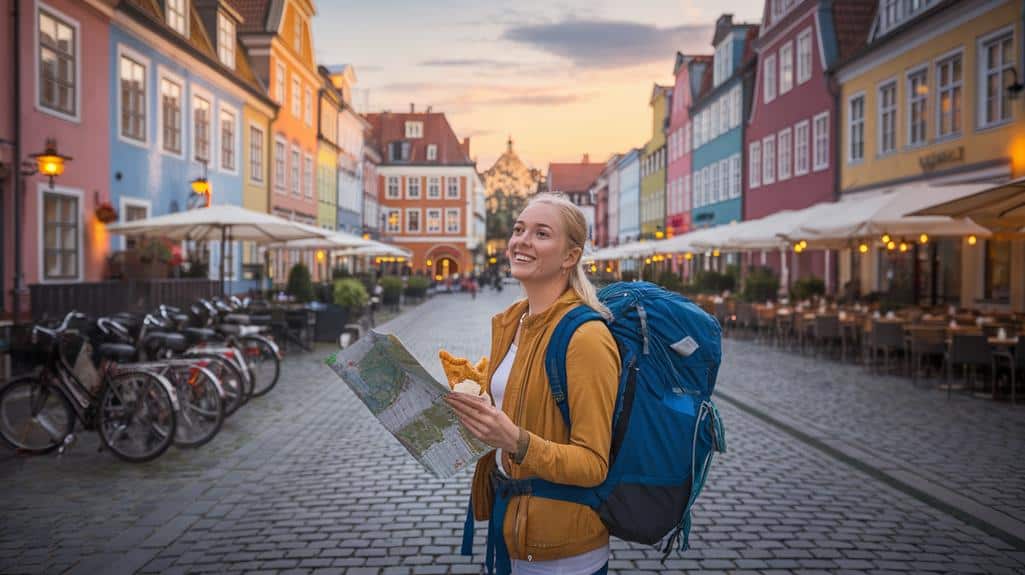
3 Clever Ways to Explore Europe on a Shoestring
To explore Europe on a shoestring, you'll need to be strategic with your choices. First, embrace budget accommodation options like hostels, which offer dormitory-style rooms and communal spaces at a fraction of hotel prices. Many hostels also provide private rooms for couples or families. Second, leverage public transportation systems, which are extensive and cost-effective in Europe. City passes or regional travel cards can offer unlimited rides on buses, trams, and metros for a fixed price. Third, eat like a local by visiting neighborhood markets, food halls, and street vendors for affordable, authentic cuisine. These clever strategies will help you stretch your budget without sacrificing experiences. Discover more ways to make your European adventure both memorable and economical.
In a Nutshell
- Stay in budget accommodations like hostels, use couchsurfing, or book affordable hotel chains.
- Utilize public transportation systems, including city passes and overnight trains, for cost-effective travel.
- Eat like a local by visiting markets, food halls, and street vendors for affordable, authentic cuisine.
- Take advantage of free walking tours and museum days offered in many European cities.
- Use travel reward credit cards or miles to offset costs of flights and accommodations.
Embrace Budget Accommodation Options

Three budget-friendly accommodation options can make your European adventure more affordable. First, consider hostels, which offer dormitory-style rooms and communal spaces at a fraction of hotel prices. Many hostels now provide private rooms for couples or families, balancing privacy with cost-effectiveness. Secondly, explore Couchsurfing, a platform connecting travelers with locals offering free accommodation. This option not only saves money but also provides cultural immersion and local insights. Finally, investigate budget hotel chains like Ibis or Motel One, which offer standardized, no-frills rooms at reasonable rates across multiple European cities. These chains typically provide clean, comfortable spaces with essential amenities such as Wi-Fi and en-suite bathrooms. When packing for your budget-friendly stay, consider using lightweight luggage to facilitate moving between accommodations, especially if you're planning to use public transportation. By alternating between these options, you'll substantially reduce your accommodation expenses, allowing for a longer stay or additional experiences during your European journey.
Leverage Public Transportation

Traversing Europe's cities and countries efficiently and affordably is key to a budget-friendly trip. Public transportation systems in Europe are often extensive, reliable, and cost-effective. Invest in city passes or regional travel cards, which offer unlimited rides on buses, trams, and metros for a fixed price. These passes frequently include discounts on attractions, further maximizing your savings. For longer journeys between countries, consider overnight trains to save on accommodation costs. Book tickets in advance for the best deals, especially on high-speed rail services. To keep your belongings organized during your travels, consider using packing cubes to maximize space in your luggage and keep items easily accessible. This can be especially helpful when maneuvering public transportation with your belongings. Apps like Rome2Rio and Google Maps can help you plan ideal routes and compare prices across different modes of transport. Don't overlook regional bus services, which can be considerably cheaper than trains for certain routes. By strategically combining various public transportation options, you'll minimize travel expenses while maximizing your exploration of Europe's diverse landscapes and cultures.
Eat Like a Local

Embracing local culinary traditions is a surefire way to experience authentic European culture while keeping your budget in check. Seek out neighborhood markets, where you'll find fresh, affordable produce and regional specialties. Many European cities offer food halls, combining multiple vendors under one roof, providing diverse options at reasonable prices. Don't shy away from street food; it's often delicious and cost-effective. When dining out, opt for lunch specials or fixed-price menus, which are typically cheaper than à la carte options. Avoid tourist traps near major attractions; instead, venture into residential areas where locals eat. Consider picnicking in parks or scenic spots, utilizing supermarkets for supplies. To stay hydrated during your adventures, invest in a durable travel bottle that can withstand the rigors of your journey while keeping your drinks at the desired temperature. Many European countries have excellent tap water, so refill your bottle instead of buying bottled water. In conclusion, embrace local dining customs, such as aperitivo in Italy or tapas in Spain, to maximize your culinary experience while minimizing costs.
Frequently Asked Questions
How Can I Find Free Walking Tours in European Cities?
You can find free walking tours in European cities through several methods. Start by searching online platforms like FreeToursByFoot or GuruWalk, which aggregate tours across various locations. Check local tourism websites and social media groups for city-specific offerings. Many hostels and hotels also organize complimentary tours for guests. Additionally, look for "free walking tour" signs in popular tourist areas, where guides often gather. Remember, while these tours are technically free, it's customary to tip your guide based on your experience.
What Are the Best Months to Visit Europe for Budget Travelers?
Ever wondered when you can get the most bang for your buck in Europe? You'll find the best deals during the shoulder seasons: April to mid-June and September to October. These months offer milder weather, fewer crowds, and lower prices on accommodations and flights. You'll avoid peak summer rates and enjoy comfortable temperatures for sightseeing. Additionally, you'll experience local festivals and events without the crush of summer tourists. Remember, though, that some attractions may have reduced hours during these periods.
Are There Any Apps That Help Find Last-Minute Travel Deals in Europe?
You'll find several apps that offer last-minute travel deals in Europe. Hopper, which analyzes flight prices and predicts the best time to book, is a top choice. Skyscanner's app lets you search for flexible dates and destinations, often revealing budget-friendly options. For accommodations, HotelTonight specializes in same-day bookings at discounted rates. Airbnb can also be a great resource for last-minute rentals. Additionally, consider using Rome2Rio to find cost-effective transportation options between European cities.
How Can I Save Money on Currency Exchange and ATM Fees?
Traversing the labyrinth of international finance, you'll want to tread carefully to avoid unnecessary costs. To save on currency exchange and ATM fees, you should:
- Use credit cards with no foreign transaction fees
- Withdraw larger amounts less frequently from ATMs
- Open a bank account with low or no international fees
- Consider multi-currency accounts or prepaid travel cards
- Exchange currency at local banks rather than airports or tourist areas
- Use apps like TransferWise for better exchange rates
What Are Some Lesser-Known European Destinations That Are Budget-Friendly?
You'll find several budget-friendly, lesser-known European destinations worth exploring. Consider visiting Brasov, Romania, with its medieval charm and proximity to Transylvania's castles. Porto, Portugal offers stunning architecture and affordable wine tasting. Kotor, Montenegro boasts breathtaking bay views and historic fortifications. In Poland, Gdansk's colorful old town and Baltic beaches won't break the bank. For nature lovers, the Plitvice Lakes in Croatia provide awe-inspiring scenery at reasonable prices. These destinations offer unique experiences without the hefty price tags of more popular European cities.
